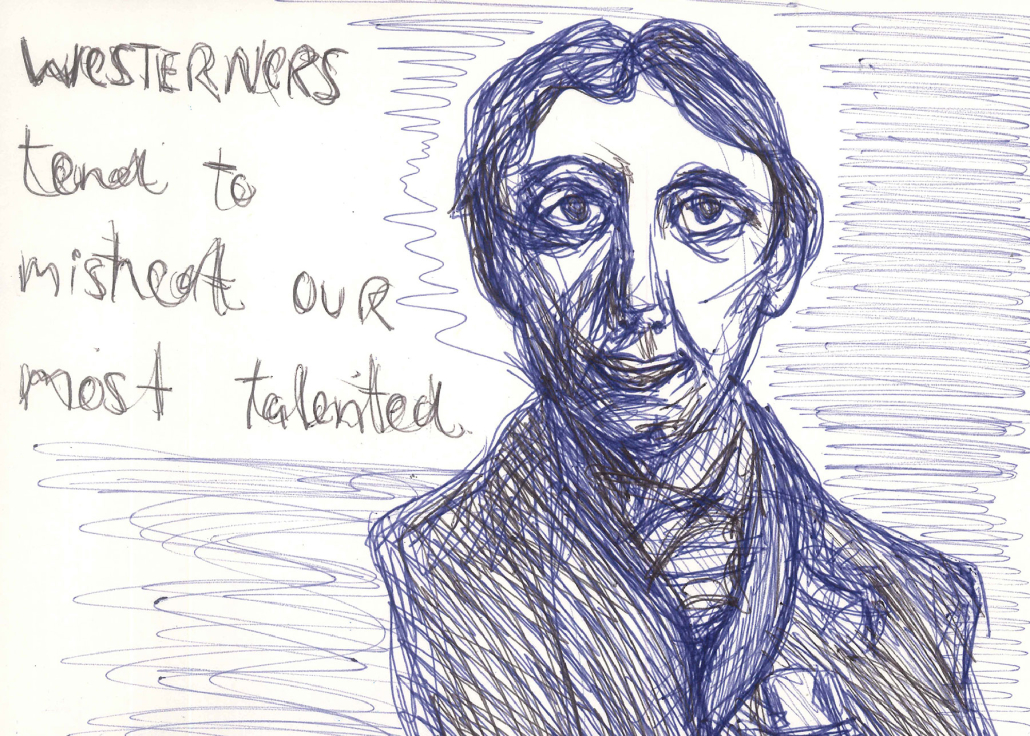Image: Danielle Joy Golding, ‘Oscar Wilde’ (detail), 2022.
‘To walk on water …’
Andrew Collis
Ordinary Sunday 19, Year A
Psalm 85; Romans 10:5-15; Matthew 14:22-33
To walk on water is to dare admit our doubts and vulnerabilities, and to trust in love. “With Christ, we dare to be honest in our lives and to explore difficult questions together.”
To walk on water is to respond to love’s summons, not with a naïve bravery that inflates our egos, but with faith, however “little”. The gospel describes a faith that is coming to be, a faith that is risk – adventure, improvisation – incorporation into a faith/faithfulness that precedes and exceeds our own.
To walk on water is to leave the boat, the church as we know it, for wider adventures in the deep, in the kindom of heaven. And so to love the church as a safe vessel and means of salvation, as well as a sacrament of the kindom.
To walk on water is to participate in the creative work of the Spirit – to take God’s hand, to see with the eyes of divine love and wisdom. And so to encourage and forgive.
Musician Bruce Springsteen tells the story of a healing encounter with his elderly father – an emotional and respectful encounter which made possible an intergenerational blessing. We have this God-given capacity, Springsteen says, to become ancestors to our children and grandchildren – ancestors that guide rather than ghosts that haunt.
To walk on water means to identify with the “ship of Jacob” (Qumran: Thanksgiving Hymns), with Job and Jonah, and all who experience distress – including more than 1,800 people who have lost their lives this year in the crossing from North Africa to Europe.
This 78th anniversary of the atomic bombing of Hiroshima, we identify with all who say, “We do not hate people, we hate war” (https://www.icanw.org).
To walk on water means to develop a discipline of prayer in the context of frantic lives and frightening situations (Radhika Sukumar-White).
To walk on water is to look and keep looking for Jesus, which means, by way of “little faith”, discerning Christ among the little ones – the hungry, thirsty, imprisoned and oppressed.
In 1881, Irish writer Oscar Wilde composed a poem inspired by our gospel entitled, “E Tenebris” (“Out of Darkness”). Wilde’s torment had to do with being a gay man in an era that regarded homosexuality a crime and a sin. Wilde’s “little faith” is expressed strongly in the poem, especially its final three lines, and will undergo a deeper transformation in the context of incarceration and hard labour.
“Come down, O Christ, and help me! reach thy hand/ For I am drowning in a stormier sea/ Than Simon on thy lake of Galilee:/ The wine of life is spilt upon the sand,/ My heart is as some famine-murdered land/ Whence all good things have perished utterly,/ And well I know my soul in Hell must lie/ If I this night before God’s throne should stand./ ‘He sleeps perchance, or rideth to the chase,/ Like Baal, when his prophets howled that name/ From morn to noon on Carmel’s smitten height.’/ Nay, peace, I shall behold, before the night,/ The feet of brass, the robe more white than flame,/ The wounded hands, the weary human face.”
To walk on water is to look and keep looking for Jesus. Not the Jesus of supernatural powers, if by this we mean merely magical feats, but God’s own peace – a Saviour with “wounded hands” and a “weary human face”.
To walk on water is to dare admit our doubts and vulnerabilities, and to trust in love. Amen.




